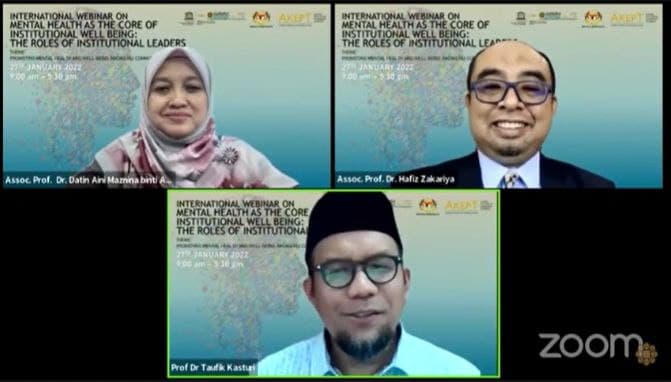By Wan Nurul Atiqah
GOMBAK, 30 January 2022: Mental health has become a major issue among communities especially in higher education institutions which have been highly impacted by the global COVID-19 pandemic.
In the third session of the international webinar organised by the Akademi Kepimpinan Pendidikan Tinggi (AKEPT) in collaboration with IIUM on Thursday (27 January), two representatives of higher learning institution (HLI) from local and international universities shared their insights and experiences on handling mental health issues.
The first speaker, Deputy Vice Chancellor (Student Affairs and Alumni) of Universiti Malaysia Terengganu (UMT), Assoc. Prof. Dr. Hafiz Zakariya shared his experiences from the perspectives of a historian, saying that the movement control order (MCO) 1.0 was the most challenging test in dealing and managing university students.
He shared the integrated approach executed during the MCO 1.0 for the UMT studentss psychosocial wellbeing that includes the following: operation room as the nerve centre of operation; counselling services; regular monitoring and assessment of the situation on the ground, organising online activities like e-competition, short stories, trivia or quizzes, vlog, poems, mental health webinar; and regular update and interaction with students and parents every two weeks
œAll these initiatives play a very important role as it is very crucial to understand and be aware about mental health issues among students through the regular monitoring of the situation.
The engagement between lecturers and students is really helpful to inspire and persuade them as well as to assure the parents that the welfare of their children are taken care of, he said.
Hafiz also highlighted in his speech the importance of communication during a crisis to provide genuine information concerning the pandemic regularly and to assure and be truthful towards the students and parents about the real situations faced by them.
œIn Malaysian context, 65 percent of students in public university are from B40 family, have single parent, have no excess to the internet, lack of study equipment, unconducive environment.
There are also students who have to work to support the family, he added.
Therefore, two post-MCO approaches mentioned by Dr. Hafiz can be done by the HLI which are, continuous counselling services especially for student learning from home and groundwork on the difficulties and problems associated with student learning from home.
Meanwhile, the Dean of the Faculty of Psychology of Universitas Muhammadiyyah Surakarta, Indonesia (UMS), Prof. Dr. Taufik Kasturi shared his view on mental health issues through the perspectives of psychology.
Taufik presented a research finding of how the pandemic has affected the students mainly from the UMS both economically and psychologically.
œThere are five psychological problems faced by the students including study problems, stress, anxiety disorders, mood swing, and somatic complaints.
œAbout 20 percent of the lecturers here are above 60 years old and some of them are confused about how to teach online, which caused difficulties to the learning process, he said.
Hence, this tells that the lack of tech-savvy educators or students who are not familiar with the modern technology might contribute to the mental health issue.
In responding to the research findings mentioned, UMS established the Student Mental Health and Wellbeing Support (SMHWS) in May 2020 aimed to improve the students mental health and wellbeing at UMS as well as to help communities affected by COVID-19 through online counselling.
All the activities organised by the SMHWS such as the webinars on psychosocial problems, the counselling, the promotion of healthy living, were focused more on providing mental health support and psycho-spiritual wellbeing for the students.
Taufik also stated that there are several trainings conducted for lecturers and officials such as the psychological first aid training for all lecturers, department heads, vice deans, and deans.
The webinar was told that the SMHWS is supported by six psychologists and several staff that work alternatively and reported that about at least three to five cases are handled every day.
Taufik ended his speech by sharing the systematic workflow at SMHWS that mainly focuses on the students conditions and problems covering both severe and light cases through counselling.
The session highlighted that communication and counselling are important aspects in dealing with crisis situation especially on mental health issues.***
